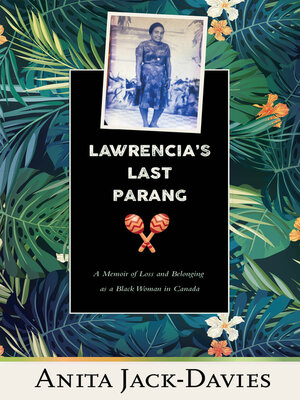Lawrencia's Last Parang
ebook ∣ A Memoir of Loss and Belonging as a Black Woman in Canada
By Anita Jack-Davies

Sign up to save your library
With an OverDrive account, you can save your favorite libraries for at-a-glance information about availability. Find out more about OverDrive accounts.
Find this title in Libby, the library reading app by OverDrive.



Search for a digital library with this title
Title found at these libraries:
| Library Name | Distance |
|---|---|
| Loading... |
Lawrencia's Last Parang: A Memoir of Loss and Belonging as a Black Woman in Canada is a snapshot of the author's life after the passing of her grandmother Lawrencia, the woman who raised her. Written in the style of a patchwork quilt that takes the reader back and forth between past and present, she examines her grief from the perspective of a Canadian-born Black woman of Caribbean descent, and she begins to question her identity and what it means to be a Black Canadian in new ways. This means exploring her childhood in Trinidad and her adult life in Kingston, Ontario, a predominantly white city; her experience of raising a mixed-raced child; and the meaning of her interracial marriage.
Given love and protection by the grandmother who raised her, she belongs to Trinidad, but she was born in Canada. Thus, she occupies what she describes as a third space, needing both Trinidad and Canada, loving both, and belonging fully to neither. In Canada, she struggles with issues of racism almost on a daily basis—everything from "where are you from?" to nurses who come to see the Black woman who gave birth to a white baby, to resentful students at the university where she teaches. Within the academy, she is again in a kind of third space as a "sometimes professor," where archetypes of the Black body (mammy, jezebel, matriarch, and welfare mother) clash with the position of authority she holds in the classroom.
Simultaneously a memoir, a eulogy, and an academic analysis, the book offers an insightful exploration of race in Canada, one that complicates these issues through the lens of identity and loss, but also through a prism of privilege.







